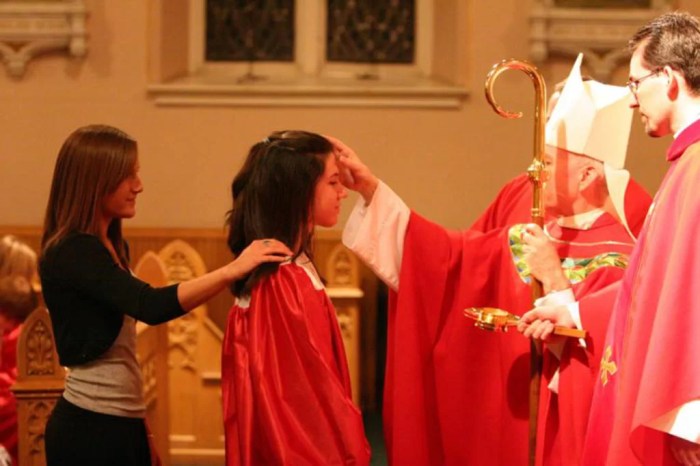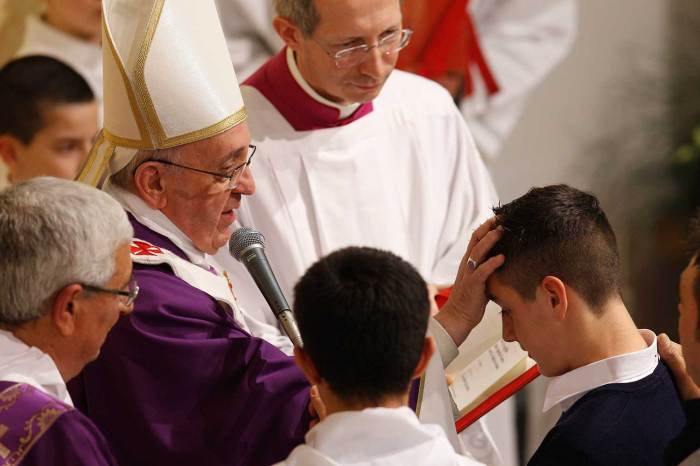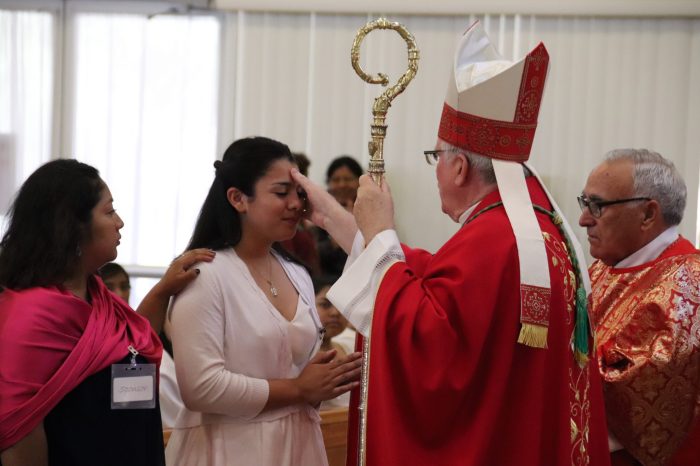Rite of confirmation roman catholic – The rite of Confirmation in the Roman Catholic Church is a profound sacrament that marks a significant step in the spiritual journey of believers. This sacred rite empowers individuals with the gifts of the Holy Spirit, deepening their connection to God and strengthening their faith.
Throughout history, the rite of Confirmation has evolved, reflecting the Church’s understanding of its theological significance. In this article, we will explore the sacrament’s theological foundation, historical development, and diverse celebrations across Catholic communities.
Sacrament of Confirmation

Confirmation is one of the seven sacraments of the Roman Catholic Church. It is a sacrament of initiation, along with Baptism and the Eucharist. Confirmation is the sacrament by which a baptized person is sealed with the gift of the Holy Spirit and confirmed as a full member of the Catholic Church.
Theological Significance of Confirmation, Rite of confirmation roman catholic
The theological significance of Confirmation is that it completes the process of initiation into the Catholic Church. In Baptism, a person is cleansed of original sin and becomes a member of the Church. In Confirmation, a person is strengthened by the Holy Spirit and confirmed as a full member of the Church.
History and Development of the Rite of Confirmation
The rite of Confirmation has developed over time. In the early Church, Confirmation was administered by the apostles. Later, it was administered by bishops. In the 13th century, the rite of Confirmation was standardized by Pope Innocent III.
Celebration of Confirmation in Different Catholic Communities
The rite of Confirmation is celebrated in different ways in different Catholic communities. In some communities, Confirmation is celebrated as a separate sacrament. In other communities, it is celebrated as part of the Easter Vigil.
- In the Roman Catholic Church, Confirmation is typically celebrated at the age of 12 or 13.
- In the Eastern Catholic Churches, Confirmation is typically celebrated at the age of 7 or 8.
- In some Catholic communities, Confirmation is celebrated as a separate sacrament. In other communities, it is celebrated as part of the Easter Vigil.
Role of the Bishop in Confirmation
The bishop is the ordinary minister of Confirmation, meaning that he has the primary responsibility for administering the sacrament. The bishop’s role in Confirmation is significant, as he represents the Church’s authority and the apostolic succession.
Anointing with Chrism
During the Confirmation ceremony, the bishop anoints the confirmands with chrism, a fragrant oil blessed by the bishop. The anointing with chrism symbolizes the outpouring of the Holy Spirit upon the confirmands and their strengthening in faith.
Teaching and Guiding Confirmands
The bishop also has a responsibility to teach and guide confirmands in their faith. This includes preparing them for Confirmation through instruction and catechesis, and continuing to support them in their spiritual growth after they have been confirmed.
Preparation for Confirmation

Confirmation is a sacrament of initiation in the Catholic Church. It completes the grace of Baptism and strengthens the recipient with the gifts of the Holy Spirit. Preparation for Confirmation is a time of growth in faith and understanding of the Catholic faith.The
traditional process of preparing for Confirmation involves three main stages:
-
-*Catechesis
This involves teaching the basics of the Catholic faith, including the sacraments, the Creed, and the Ten Commandments.
-*Spiritual Formation
This involves helping the candidate to develop a personal relationship with Jesus Christ and to grow in holiness.
-*Prayer
This involves praying for the candidate and encouraging them to pray for themselves.
Confirmation preparation programs vary from parish to parish, but they typically include a combination of catechesis, spiritual formation, and prayer. Some programs also include service projects or retreats.The importance of catechesis and spiritual formation cannot be overstated. Catechesis provides the candidate with the knowledge they need to make a mature decision to receive the sacrament.
Spiritual formation helps the candidate to develop a personal relationship with Jesus Christ and to grow in holiness. Both catechesis and spiritual formation are essential for preparing the candidate to receive the full benefits of Confirmation.
Examples of Confirmation Preparation Programs
There are many different Confirmation preparation programs available. Some of the most popular programs include:
-
-*The Rite of Christian Initiation of Adults (RCIA)
This program is designed for adults who are seeking to become Catholic. It includes a period of catechesis, spiritual formation, and prayer.
-*The Confirmation Program for Youth
This program is designed for young people who are preparing for Confirmation. It includes a period of catechesis, spiritual formation, and prayer.
-*The Confirmation Program for Adults
This program is designed for adults who are preparing for Confirmation. It includes a period of catechesis, spiritual formation, and prayer.
The best Confirmation preparation program for you will depend on your individual needs. It is important to talk to your priest or religious education director to find a program that is right for you.
Effects of Confirmation

Confirmation is a sacrament of initiation that completes the work of baptism. It strengthens the baptized with the gifts of the Holy Spirit and seals them as members of the Catholic Church.
Spiritual Effects of Confirmation
The spiritual effects of Confirmation include:
- An increase in faith
- A deepening of the baptismal grace
- A strengthening of the gifts of the Holy Spirit
- A sealing with the Holy Spirit
- A membership in the Catholic Church
Role of the Holy Spirit in Confirmation
The Holy Spirit is the principal agent of Confirmation. The Spirit descends upon the candidate and fills them with his gifts. These gifts include:
- Wisdom
- Understanding
- Counsel
- Fortitude
- Knowledge
- Piety
- Fear of the Lord
These gifts empower the confirmed to live a Christian life and to witness to their faith.
Examples of How Confirmation Strengthens Catholics in Their Faith
Confirmation strengthens Catholics in their faith in many ways. For example, it:
- Helps them to understand and believe the teachings of the Church
- Gives them the courage to live their faith in the face of opposition
- Empowers them to be witnesses to their faith in the world
Comparison with Other Christian Traditions

The Catholic rite of Confirmation is comparable to sacraments or ceremonies in other Christian traditions that symbolize the reception of the Holy Spirit. While sharing similarities in purpose, these sacraments exhibit historical and theological distinctions.
Eastern Orthodox and Eastern Catholic Churches
In Eastern Orthodox and Eastern Catholic Churches, the sacrament of Chrismation is administered immediately after Baptism, typically to infants. Chrismation is considered the completion of Baptism and seals the newly baptized into the Body of Christ. The sacrament involves anointing with holy oil, known as myron, which symbolizes the gift of the Holy Spirit.
Lutheranism
In Lutheranism, Confirmation is typically celebrated around adolescence, marking the individual’s personal affirmation of their baptismal vows. The sacrament involves instruction in the faith, followed by a public declaration of belief and a blessing by the pastor. Confirmation is not considered a sacrament in Lutheranism but rather a rite of passage.
Anglicanism
In Anglicanism, Confirmation is administered to baptized individuals who have reached a certain age of maturity. The sacrament involves a bishop’s laying on of hands, accompanied by prayer and the anointing with holy oil. Confirmation is considered a sacrament in Anglicanism and is believed to strengthen the individual’s faith and equip them for Christian service.
Methodism
In Methodism, Confirmation is typically celebrated around adolescence or adulthood. The sacrament involves a public declaration of faith, followed by a blessing by a minister. Confirmation is not considered a sacrament in Methodism but rather a rite of passage that marks the individual’s commitment to the Christian faith.
FAQs: Rite Of Confirmation Roman Catholic
What is the theological significance of Confirmation in the Roman Catholic Church?
Confirmation is a sacrament that completes the initiation into the Christian faith, strengthening the baptized person with the gifts of the Holy Spirit.
What is the role of the bishop in Confirmation?
The bishop, as successor to the apostles, is the ordinary minister of Confirmation. He anoints the confirmands with chrism, a consecrated oil, and imparts the gifts of the Holy Spirit.
How does one prepare for Confirmation?
Preparation for Confirmation typically involves catechesis, prayer, and spiritual formation programs that help the candidates deepen their understanding of the faith and their commitment to live as Christians.